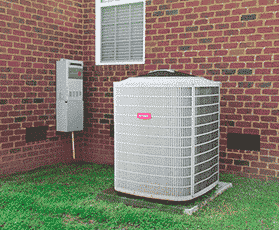
Heat pumps are essential components in modern HVAC systems, providing both heating and cooling by efficiently transferring heat. Let’s delve deeper into understanding how they function, the key components, and some important safety considerations. If you are thinking about a heat pump installation in Baytown, TX or The Woodlands, contact Expert Air today!
Simply put, the heat pump uses the outside air to heat a home in the winter months while using the same outside air to cool a home during the summer months. The outdoor unit is referred to as a heat pump. Heat energy is always present, whether in cold or hot temperatures. The heat pump acts like an air conditioner during the summer, removing heat from your home.
How Does a Heat Pump Work?
A heat pump is a versatile device that plays a dual role:
- Winter Heating: In colder months, the heat pump extracts heat from the outside air and uses it to warm your home.
- Summer Cooling: During the warmer season, it operates similarly to an air conditioner by extracting heat from inside your home and releasing it outdoors, thus cooling the interior.
It’s worth noting that heat energy is omnipresent, even in cold temperatures. The heat pump’s capability to transfer this ever-present heat energy, rather than producing it, is what sets it apart.
Energy Efficiency of Heat Pumps
One of the standout features of heat pumps is their energy efficiency. Here’s why:
- Heat Movement, Not Generation: Unlike traditional heating systems, heat pumps don’t generate heat. Instead, they move it, which requires significantly less energy.
- Electricity-Powered: The HVAC system is powered by electricity, but it’s the operation of the heat pump that boosts its efficiency.
- Utilization of Renewable Energy: Heat pumps harness renewable energy by tapping into the low-temperature heat available in the environment.
Key Components of a Heat Pump
Understanding the major components can provide a clearer picture of how a heat pump operates:
The Outdoor Unit:
- Compressor: Compresses the refrigerant, increasing its temperature.
- Reverse Valve: Allows the system to switch between heating and cooling modes.
- Fan and Motor: Assists in heat exchange by moving air over the coils.
- Defrost Control: Helps in removing frost from the outdoor coils in colder months.
- Electrical Components: These facilitate the operations of other components.
Air Handler:
- Evaporator Coil: Aids in heat transfer with the surrounding air.
- Blower Motor: Circulates air through the HVAC system.
- Electric Heater Pack: Provides auxiliary heat when the heat pump might not be sufficient.
Safety and Maintenance Considerations
When it comes to heat pump maintenance or repairs, safety should always be a priority:
- Professional Assistance: It’s recommended to contact professionals like Expert Air for installation, maintenance checks, or repair services.
- High Voltage Danger: Heat pumps operate on a 240-volt circuit. A lack of proper knowledge can lead to severe shocks or even electrocution.
- Technological Complexity: Many of today’s systems are technologically advanced, making repairs intricate. It’s best left to professionals who understand the nuances and intricacies of the system.
If it seems time to replace your heat pump, contact the professionals at Expert Air to schedule our installation, your maintenance check, or your repair service. Heat pumps are on a 240-volt circuit, so severe shock or electrocution is possible without a thorough understanding of electricity, so don’t attempt to do the repair yourself. Most systems today are so technologically advanced that the complexity of repair is more intensive.



